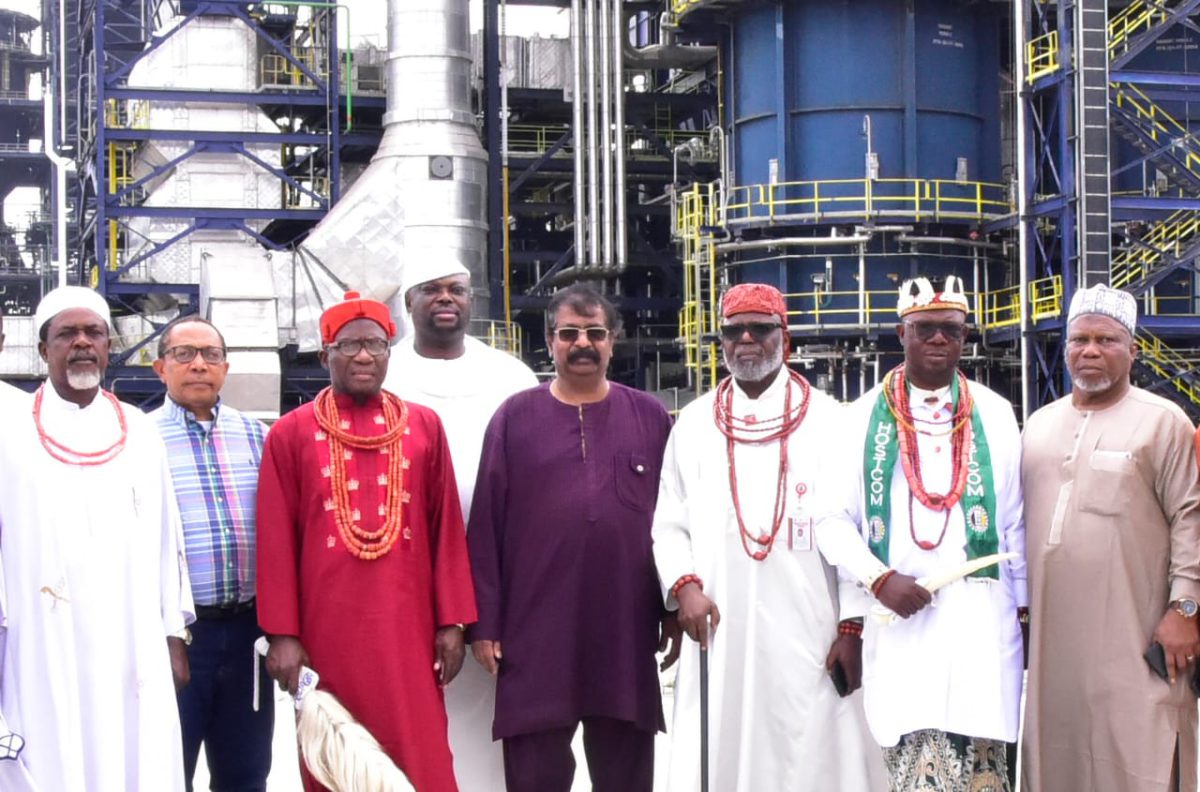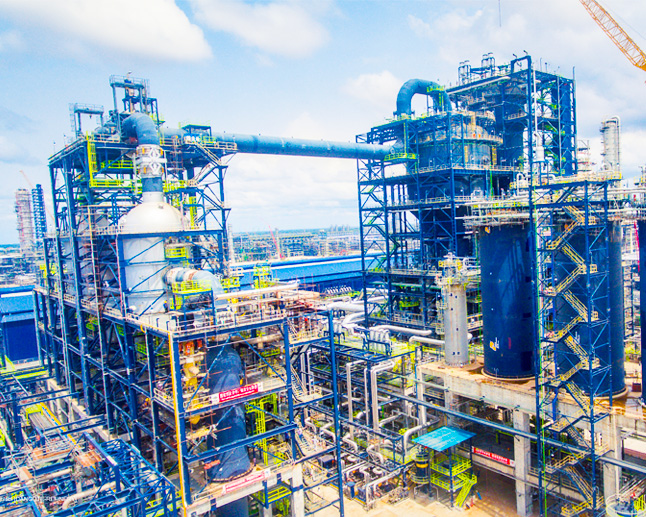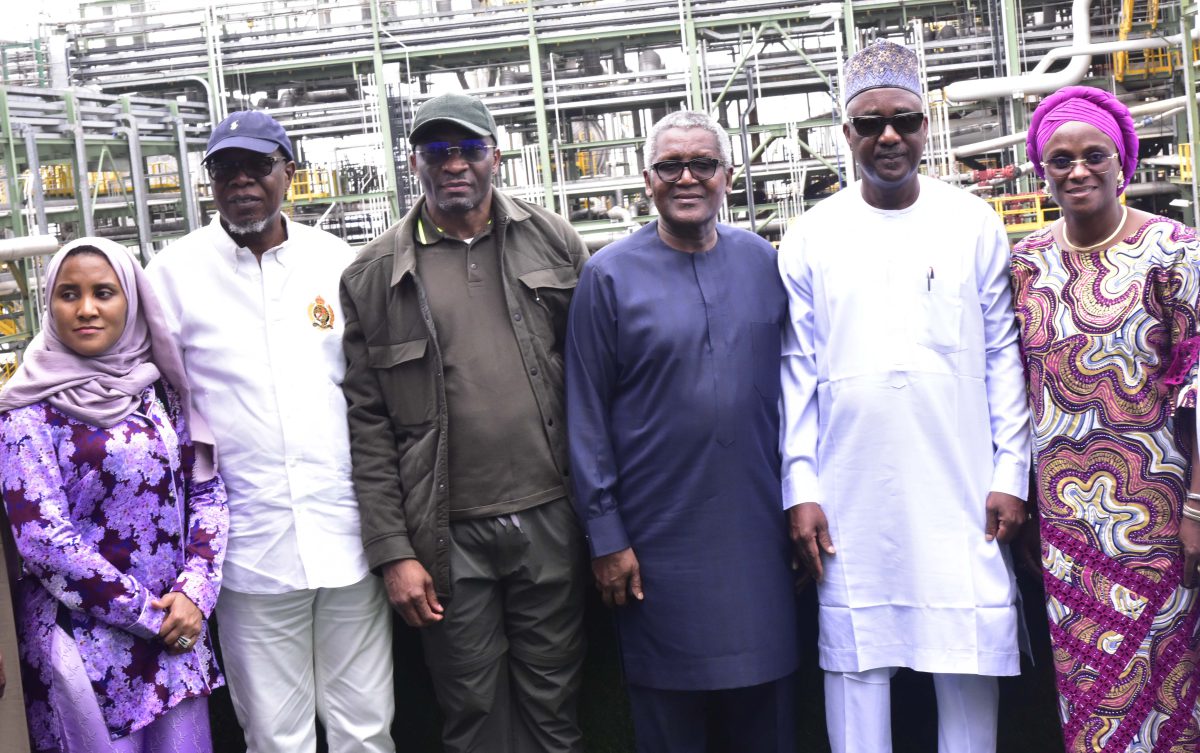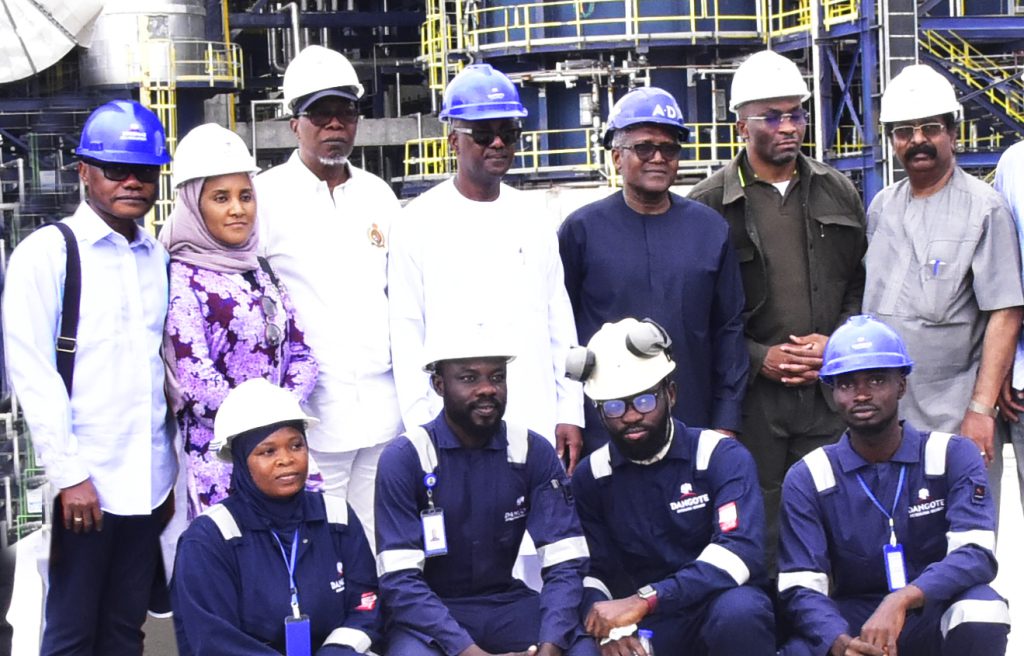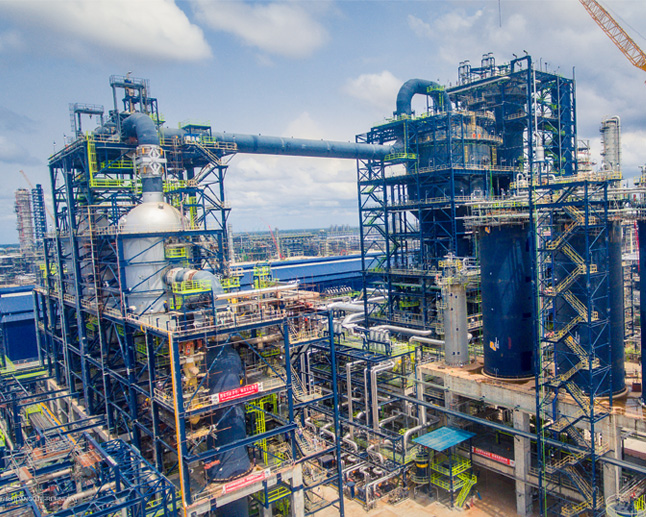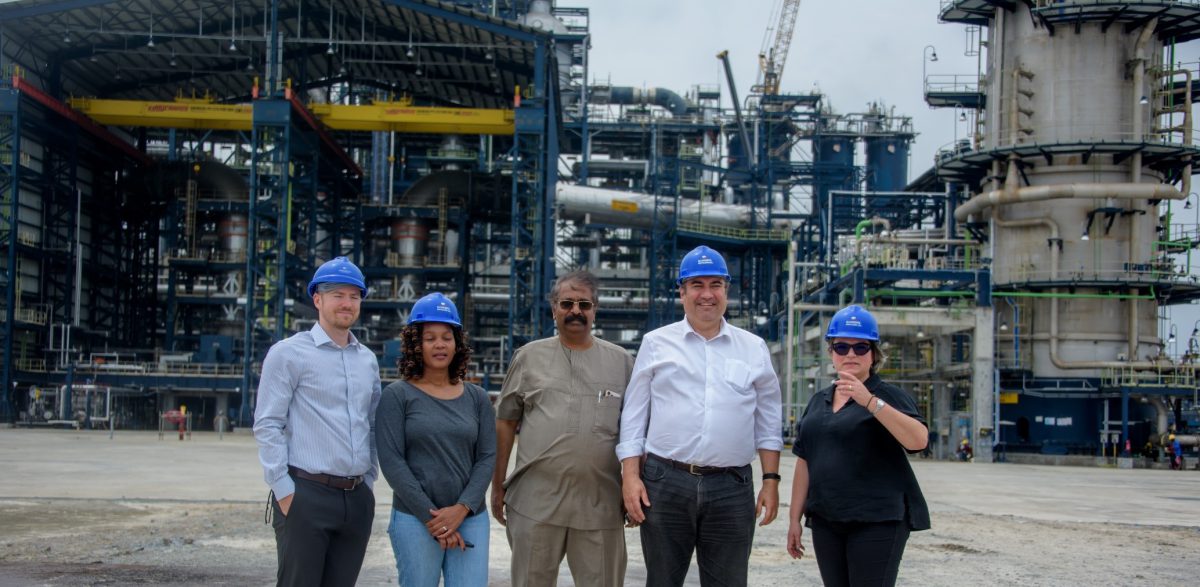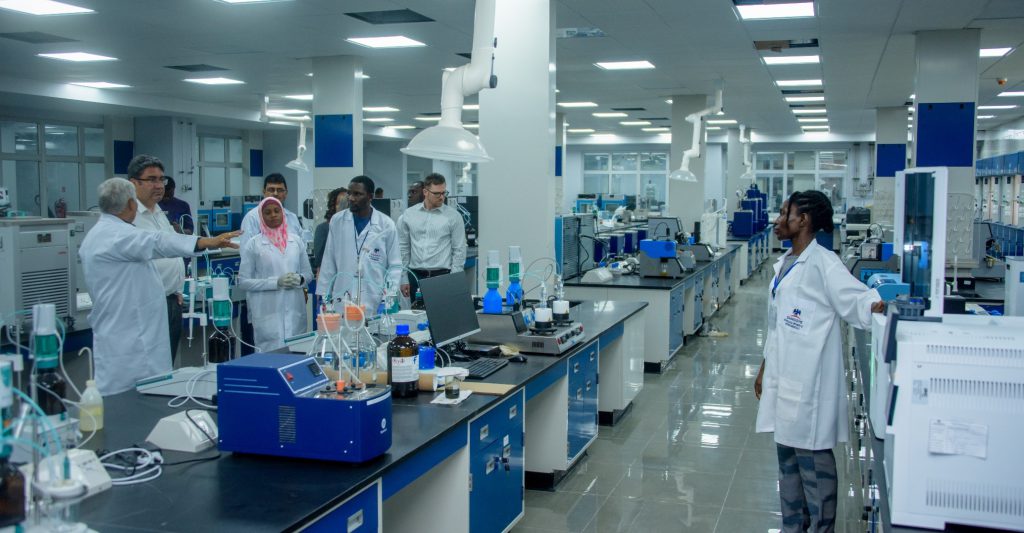The Host Communities of Nigeria Producing Oil and Gas (HOSTCOM) has urged the Federal Government to back the Dangote Petroleum Refinery & Petrochemicals and other domestic refineries to end the reliance on imported petrol, diesel, and other refined products.
The group pointed out the long-standing issues with government-owned refineries, which have been inactive for over two decades. Despite being a leading crude oil producer in Africa, Nigeria continues to depend on imports for its refined product needs.
During a visit to the Dangote Petroleum Refinery in Ibeju Lekki, which has a capacity of 650,000 barrels per day, HOSTCOM’s leadership emphasised the need for Nigeria to refine its crude locally.
The National President of HOSTCOM, Dr. Benjamin Tamaramiebi, accompanied by his executives and traditional rulers from the Niger Delta, toured both the refinery and the Dangote Fertiliser Limited complex. Notable traditional rulers included the Chairman of the Niger Delta Monarchs Forum, HRM Frank Okorakpo; Deputy Chairman of the Traditional Rulers of Oil Mineral Producing Communities of Nigeria (TROMPCON), HRM Obafemi Ogaro; and Egbesuwei Gbanraun X Agadagba Pere, HRM (Capt) Frank Okiakpe, among others.
In a statement following the tour, HOSTCOM’s President called for nationwide support for the Dangote Petroleum Refinery to eliminate the need for imported refined products.
The group expressed gratitude to the National Assembly and Nigerians but warned against any acts of sabotage that could hinder the country’s progress towards self-sufficiency in refined products.
“We are grateful to the 10th National Assembly, good-spirited individuals and associations who have been rallying support for Aliko Dangote. We HOSTCOM have come today to drum up supports for Dangote Refinery. We will stand with Dangote to put an end to continuous importation of less quality and costly refined Petroleum Products into Nigeria,” stated the group.
The group, comprising all states producing oil and gas in Nigeria, lamented that despite the billions of dollars spent on turnaround maintenance of Nigeria’s refineries, the country remains reliant on importing refined products. This persistent issue, it argues, highlights the widespread corruption within Nigeria’s oil and gas industry, allegedly orchestrated by influential cabals who are intent on maintaining the status quo of exporting crude oil while importing refined petroleum products. HOSTCOM warned that it will not hesitate to publicly name these identified cabals if necessary.
“Our visit today to the largest and magnificent 650,000 bpd private Refinery in Africa (DANGOTE REFINERY) has opened our eyes to several ills, particularly to the monumental corruption going on in the Nigeria Oil and gas Industry. It is obvious the reason why the existing Federal Government Refinery in Port Harcourt, Warri and Kaduna can never work or operate maximally despite the billions of dollars that have been spent on the so-called Turn Around Maintenance over the years. It is now clear that some persons in government and outside government have been identified as the Cabal holding the Nigeria oil in the Jugular, we have identified them, and we shall make their names known to the people of Nigeria,” it said.
HOSTCOM, which emphasised that every Nigerian’s aspiration is for the country to refine its own crude oil for the benefit of its people, warned that any individual who opposes this national desire will face the wrath of the masses.
The group also lampooned the Chief Executive of the Nigerian Midstream and Downstream Petroleum Regulatory Authority (NMDPRA), Farouk Ahmed, over his recent statement that the government would not halt the importation of refined petroleum products. HOSTCOM called on President Bola Ahmed Tinubu to remove Ahmed from his position, arguing that his previous associations with key players in the sector make him unfit to effectively regulate the downstream industry.
“We therefore unequivocally call for the immediate sack of Farouk Ahmed. It is now clear that he as the CEO of NMDPRA is responsible for issuing import licenses to his cronies outside the government to continue to import Sub-standards Refined Petroleum Products into the Country. In hindsight, this is not surprising given that he has served on the boards of some downstream companies in the past. He is therefore obviously conflicted and incapable of performing the duties of a regulator for the downstream sector. It is important to immediately replace him with an individual who is not encumbered by such conflict,” the group added.
The group praised the President of Dangote Industries Limited, Aliko Dangote for his patriotism in investing in and constructing the refinery in Nigeria, noting that his endeavour has significantly contributed to the country’s economic growth and development. It emphasised that the refinery is crucial in providing local solutions to Nigeria’s refining needs, thereby reducing the nation’s dependency on imported refined petroleum products.
The group urged President Tinubu to support the project, highlighting that it will enhance the economy, create thousands of jobs, ensure the sustainability and affordability of products, and bring substantial benefits to the host communities, among other positive effects.
“We called on President Bola Tinubu to support and sustain this refinery which is in his own state. He must do a way with the cabals holding the oil sector to ransom,” it added.
The group further asserted that the President must not tolerate the economic sabotage being carried out by the International Oil Companies (IOCs) operating in Nigeria, which have refused to sell crude oil to the Dangote Refinery and other modular refineries. They condemned this as an affront to the Nigerian people and a deliberate attempt to undermine the President’s renewed hope agenda, which aims to revive the economy.
“We call on Mr President to direct NNPC OR NNPCL to compel the IOCs operating in our communities to sell and supply Crude Oil to Dangote Refinery and other Local Refineries in line with section 109 of the Petroleum Industry Act PIA 2021 particularly section 109(4)(b) “the supply of crude oil shall be commercially negotiated between the lessee and the crude oil refining licensee, having regard to the prevailing international market price for similar grades of crude oil,” it added.
It also pointed out that, despite the PIA, the IOCs continue to lack transparency and accountability, alleging ongoing exploitation of oil-producing communities. The group warned that if the IOCs fail to supply crude oil to domestic refineries, host communities will be forced to take decisive action.
“In conclusion, If the NNPC and the IOC fail to abide by the domestic crude oil supply obligation to sell and supply crude Oil to modular refineries and Dangote Refinery, we HOSTCOM will begin agitation for greater Autonomy and control of our resources,” it added.
The VP of Gas and Oil at Dangote Industries Limited, Devakumar Edwin, who hosted the delegates, explained that the refinery was established primarily to source and refine local crudes for the benefit of Nigeria, while also exporting excess production to boost the economy. He noted that the lack of sufficient Nigerian crude supplies has necessitated importing crude from other countries and continents. He said that if the refinery had not been designed to process a wide range of crudes, including various African and Middle Eastern crudes as well as US Light Tight Oil, it would have become inactive due to the lack of Nigerian crude supplies.
Edwin said that products from the refinery are of superior quality and meet international standards, conforming to Euro V specifications. This high standard has enabled the refinery to export jet fuel to Europe and the United States.
Edwin added that the refinery is committed to environmental protection as it is designed to comply with US EPA regulations, European emission standards, Department of Petroleum Resources (DPR) emission norms, and African Refiners and Distributors Association (ARDA) standards.
He also noted that the refinery, dedicated to enhancing local contents, has made substantial contributions to its host communities, and significantly boosted employment opportunities within the country.
